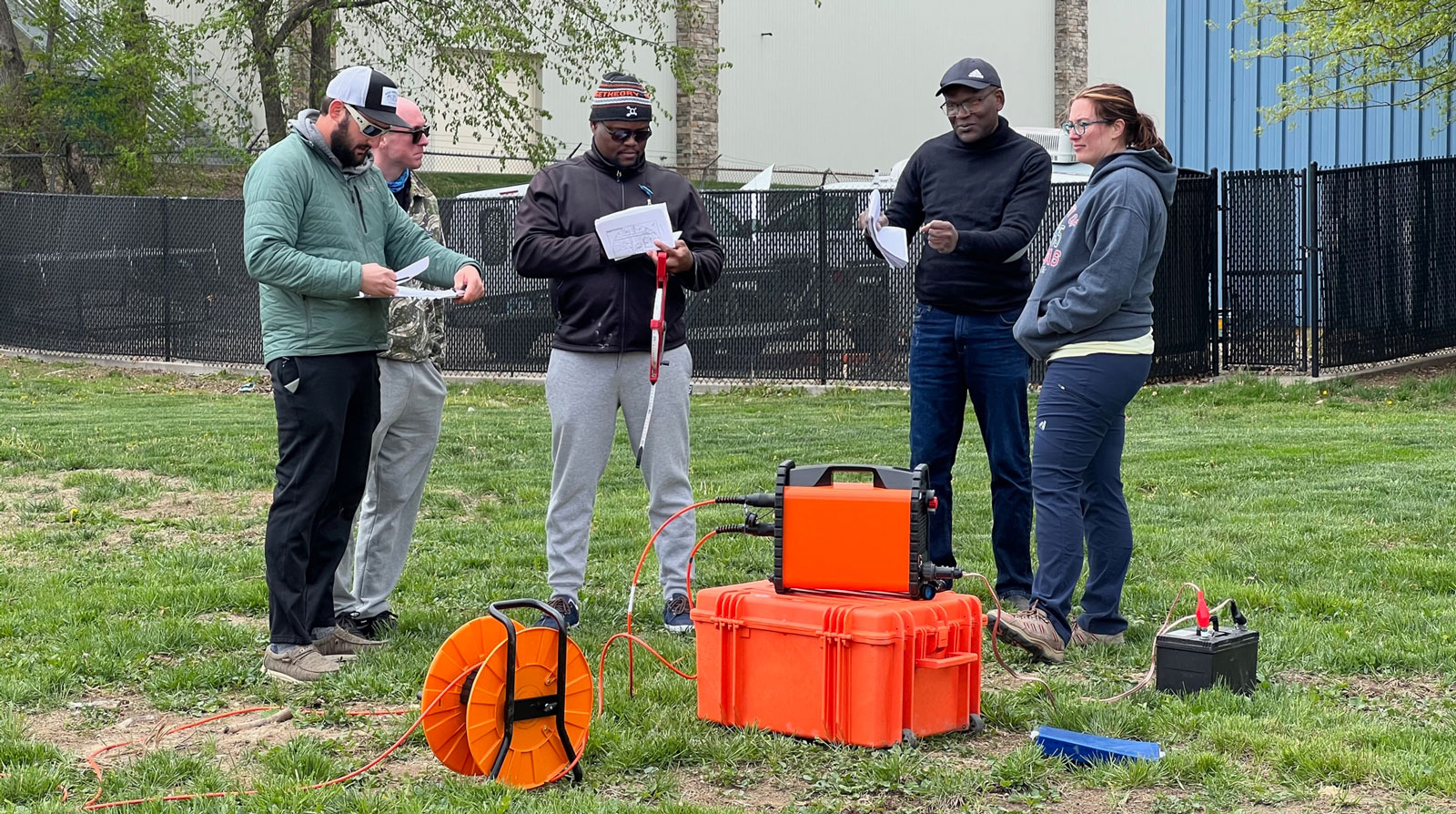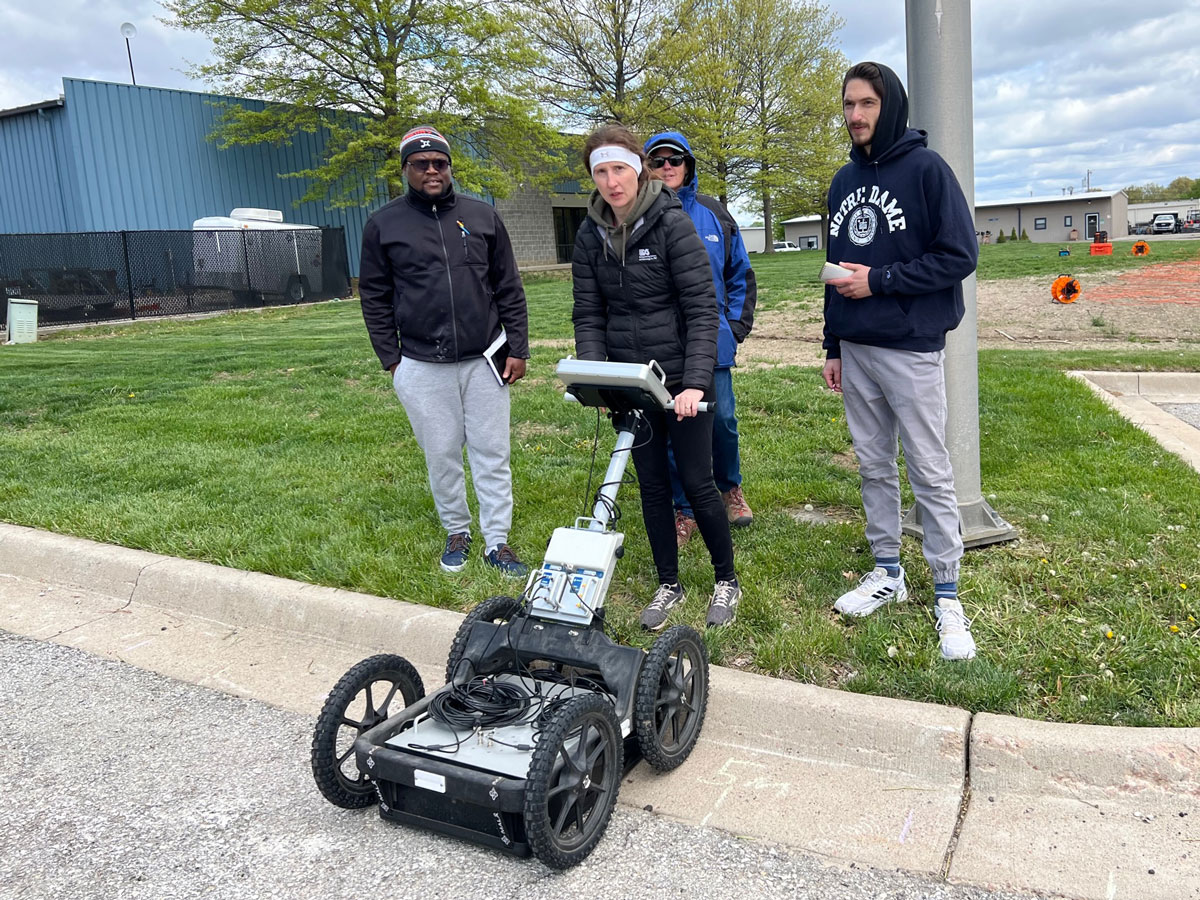KUEC geology students earn foundational field experience

For environmental geology students, learning in a classroom can get you only so far. Eventually, you’ll have to take your studies outside. Now, thanks to a series of field workshops, aspiring geophysicists can earn the kind of practical experience they can apply to their future careers.
In April, Marcia Schulmeister, director and teaching professor of KU Edwards Campus environmental geology programs, and Blair Schneider, associate researcher at the Kansas Geological Survey (KGS), a research and service division of KU, partnered with the City of Overland Park to host a daylong field workshop. There, seven students from KU’s professional science master’s program gained hands-on experience studying geophysical methods that had, until then, been restricted to the whiteboard.
“We strive to teach at actual field sites that represent the sort of ‘real-world’ conditions graduates are likely to encounter in their jobs,” says Schulmeister.
The field site in question is the Blue Valley Public Works facility, headquarters to municipal services doing precisely the kind of work in which Schulmeister’s students are being trained. Students saw important geophysical principles in action — including ground-penetrating radar, electrical resistivity, frequency domain electromagnetics, and magnetometry — and learned how to identify buried objects like tanks and wells.

These kinds of object lessons once proved invaluable for Schneider. “I was really fortunate to be able to gain hands-on experience with geophysics equipment through internships at the National Park Service when I was a graduate student at KU,” she says. “That’s what really drew me to teach this course and support this program. You can’t beat authentic experience to design a survey, collect the data, and then interpret the results.”
For environmental geology students, field experience is vital. Environmental geology helps us understand the impacts of human activities on our world. Government officials and private industries rely on environmental geologists to responsibly inform and mediate growth and development. They devise solutions to significant environmental challenges, such as pollution, resource contamination, waste management, and disastrous erosion.
“Our courses are intended to provide environmental scientists with access to relevant equipment they will use in their careers,” Schulmeister adds.
The practical skills and knowledge the students learn at the workshop will pay dividends when they start the post-KU career search. Fortunately, those careers aren’t in short supply. According to the U.S. Bureau of Labor Statistics, demand for environmental geologists is on the rise and expected to continue growing over the next decade. The career potential is broad, with positions commonly available in private consulting firms, government agencies, and the oil and gas industry.
Beyond hands-on exposure to state-of-the-art field equipment, Schulmeister says the workshops provide an important social component for her students, an “opportunity for the group to meet each other face-to-face while completing the program.” Most students in the professional science master’s program are earning their degrees online. Of the workshops attendees, half were from outside Kansas, hailing from Louisiana, New York, Texas, Ohio, Pennsylvania, and Kentucky. The workshops — which are held on Saturdays — afford students in-person facetime with peers and professors that they couldn’t otherwise get.
Madi Kakaba made the trek from Baton Rouge to attend the workshop. Given his career aspirations, the trip was worth it. “I would like to change my career and work as an environmental geologist,” says Kakaba. “To achieve this goal, I need to grasp the concepts and master the techniques to help me understand environmental pollution, assessment, and remediation. This workshop was very informative.”
KU geologists are used to going the distance. Every summer, KU geology programs host field camps outside Cañon City, Colorado, where students participate in weeks-long courses applying core geological principles and tools along trails, creeks, and mountainsides. The camp has existed in some form for over a century and offers students an immersive experience far beyond campus boundaries.
Although much smaller in scale, the environmental geology workshop shares a common purpose with the Colorado field camp: to prepare students for the workforce by placing them in real-world situations and allowing them to practically apply their coursework. In that regard, Schulmeister and Schneider have provided an essential opportunity for aspiring geophysicists — and the multitudes at large who benefit from their specialized expertise.





